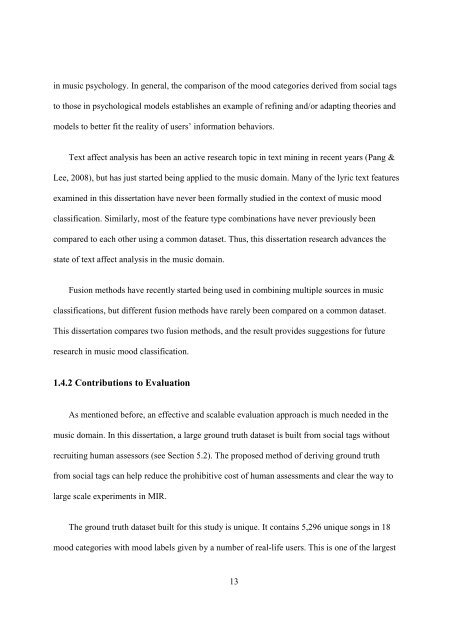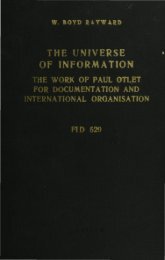improving music mood classification using lyrics, audio and social tags
improving music mood classification using lyrics, audio and social tags
improving music mood classification using lyrics, audio and social tags
Create successful ePaper yourself
Turn your PDF publications into a flip-book with our unique Google optimized e-Paper software.
in <strong>music</strong> psychology. In general, the comparison of the <strong>mood</strong> categories derived from <strong>social</strong> <strong>tags</strong><br />
to those in psychological models establishes an example of refining <strong>and</strong>/or adapting theories <strong>and</strong><br />
models to better fit the reality of users’ information behaviors.<br />
Text affect analysis has been an active research topic in text mining in recent years (Pang &<br />
Lee, 2008), but has just started being applied to the <strong>music</strong> domain. Many of the lyric text features<br />
examined in this dissertation have never been formally studied in the context of <strong>music</strong> <strong>mood</strong><br />
<strong>classification</strong>. Similarly, most of the feature type combinations have never previously been<br />
compared to each other <strong>using</strong> a common dataset. Thus, this dissertation research advances the<br />
state of text affect analysis in the <strong>music</strong> domain.<br />
Fusion methods have recently started being used in combining multiple sources in <strong>music</strong><br />
<strong>classification</strong>s, but different fusion methods have rarely been compared on a common dataset.<br />
This dissertation compares two fusion methods, <strong>and</strong> the result provides suggestions for future<br />
research in <strong>music</strong> <strong>mood</strong> <strong>classification</strong>.<br />
1.4.2 Contributions to Evaluation<br />
As mentioned before, an effective <strong>and</strong> scalable evaluation approach is much needed in the<br />
<strong>music</strong> domain. In this dissertation, a large ground truth dataset is built from <strong>social</strong> <strong>tags</strong> without<br />
recruiting human assessors (see Section 5.2). The proposed method of deriving ground truth<br />
from <strong>social</strong> <strong>tags</strong> can help reduce the prohibitive cost of human assessments <strong>and</strong> clear the way to<br />
large scale experiments in MIR.<br />
The ground truth dataset built for this study is unique. It contains 5,296 unique songs in 18<br />
<strong>mood</strong> categories with <strong>mood</strong> labels given by a number of real-life users. This is one of the largest<br />
13
















